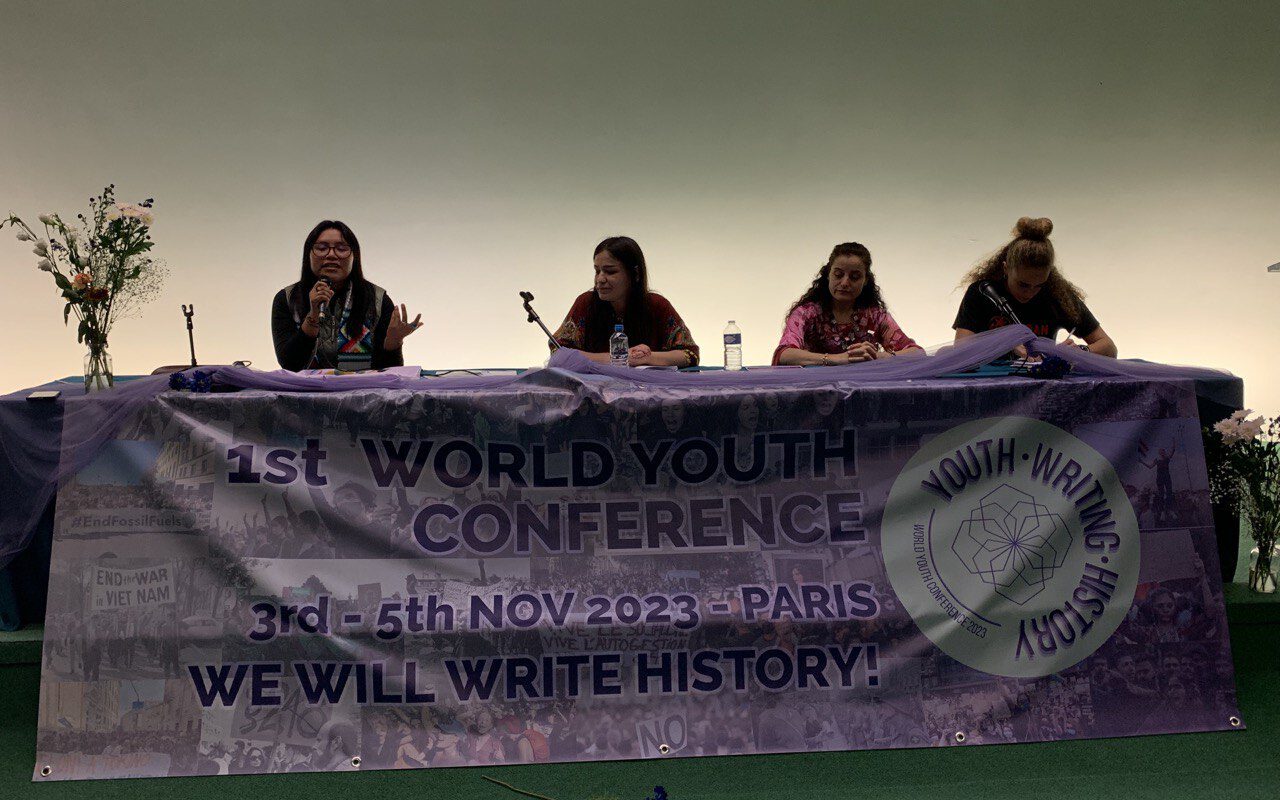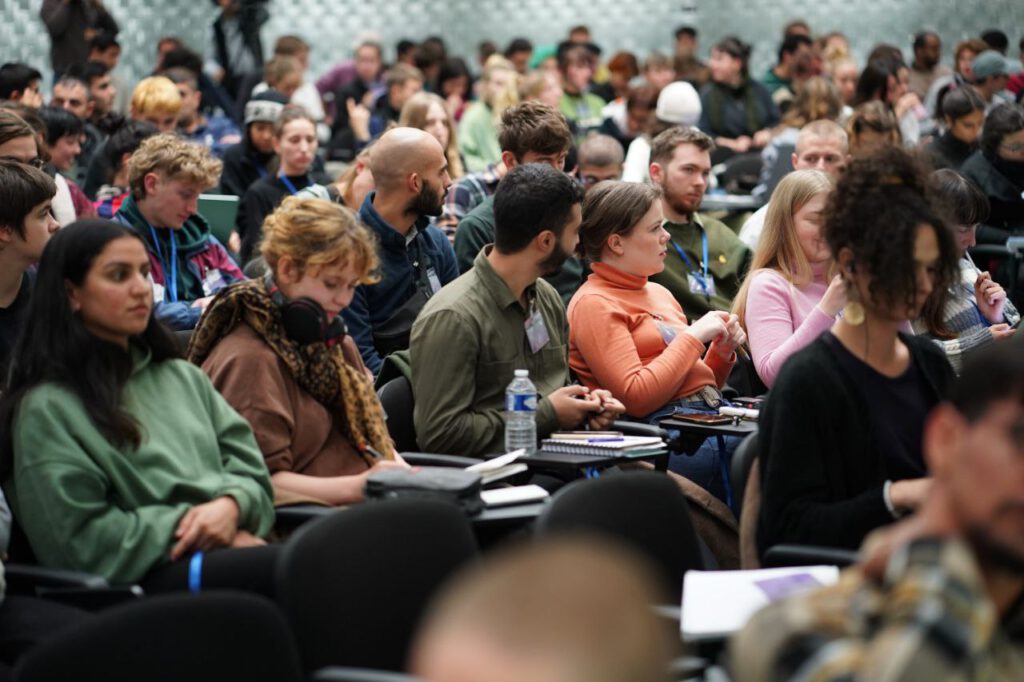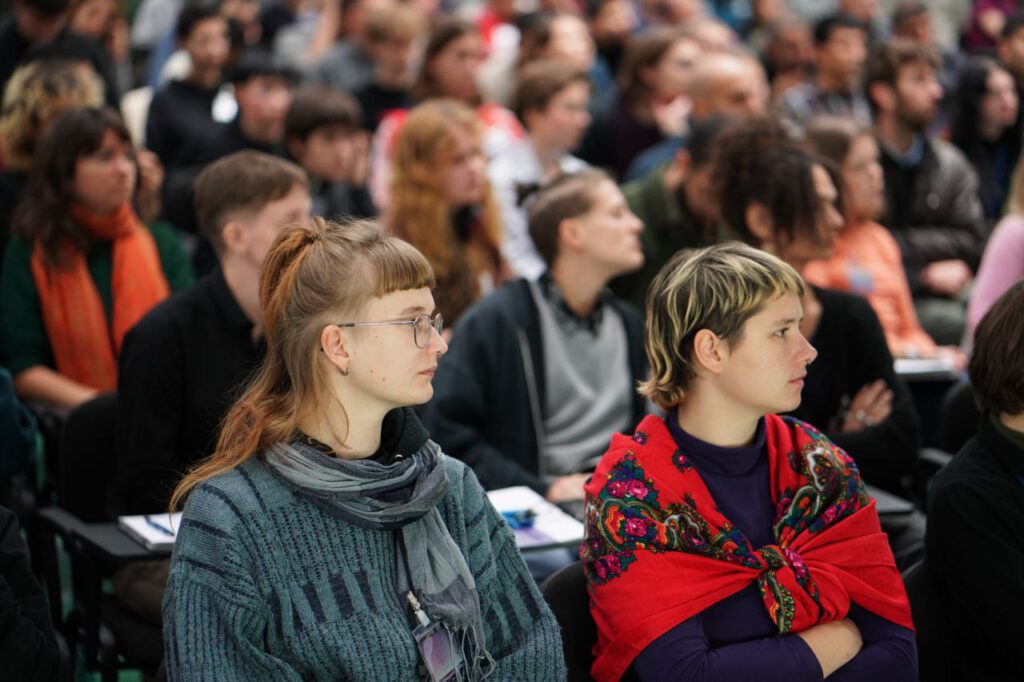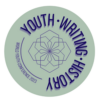Sunday, 5.11.23 – panel discussion –
On the last day of the conference, a big panel discussion was held on the topic „Young Women Writing History“. Speakers were Medya from Rojava as a representative of the Yekitiya Jinên Ciwan ya Rojava (YJCR), Julia Rosita from the organization Fenmucarinap of the territory claimed by Peru, as well as Ceska for Arran from Catalunya. First they were asked to outline the situation of women’s oppression in general and in their specific localities.

Young women face a reality of double-oppression: they are subjected to the systems of patriarchy as well as gerontocracy, which is to say the oppression of the youth by the elderly.
„Young women doubt even their own existence!“
– Medya (YCJR)
Their oppression can be seen very clearly in women’s situation in pre-revolutionary Rojava. It is that of the woman as an object, completely defined by a feudal system of patriarchy, built on the authority of the older man. In it, the family is the “the smallest unit” of patriarchal state. The control of women in the Middle East is deep, all-encompassing but at the same time very subtle. She is entrapped her in the confines of the home and under the control of the family, kept away from all forms of education. The control asserted over the woman in the family reflects the control asserted over the human being by the nation-state, more general. As such, patriarchal mentality also plays a big role in oppressing social nature. It is a mentality of ownership and of asserting power over the others.
In Peru, as Julia underlined, a lot of violence is rooted in the mentality of owning a woman and having the right to decide about her life and death. At the same time this logic is extended to the natural environment which is seen, for example, the massive destruction of the Amazon by mining.
She continued to explain that we live in a world created for men. It is not designed for women to express their opinion, to be political and it is sometimes not even a place for women to live.
The women in Abya Yala, especially those that are indigenous, live through an intense repression. They are regarded as a political danger and those who are organized are the principal target for executions and abductions.
„We have lost sisters, brothers and parents!“
– Julia Rosita (Fenmucarinap)
This is a reality shared by women in the world. In Rojava, as an example, it is the women that are leading the revolution. They are also targeted by the Turkish drone strikes, such as Jiyan Tolhildan, YPJ Commander and hero of the Kobanî resistance against the Islamic state.
“The hardest attacks against the revolutions of this world are attacks against women”
– Medya

This is because the patriarchal state forces see the strength that lies within woman when they are organized.
„Once the women in Rojava broke out of the cage that entrapped them, they started to fly and nothing could hold them back!“
– Medya
Nevertheless, the necessity for women to create a free life for the whole society is something we constantly need to struggle for.
Ceska points out the dangers, inherent in a feminism that is made subservient to the state. Capitalism absorbs progressive elements, integrates by individualizing them into separate issues.
At the same time, feminism is instrumentalized by the patriarchal counter-revolution. Violence against women is „racialized“. It is stated that after the liberation of women – a process allegedly more or less finished in the West – it is now the migrants that endanger their rights, bodies and dignity. This condition was named as „Femi-nationalism“ and plays right into the hands of the current support for anti-immigration laws. It is portrayed as a defense of progressive values.

On the other hand, on the conservative right, a strong anti-feminism is rising. Preying on the fear of social disintegration, of a „feminism out of control which is destroying society“, this position is characterizing itself as defending traditional values.
This is, on the first glance, a seeming contradiction in the system’s response to the women’s movement of the last century. But the result in the end is a combined effectiveness in playing „divide and conquer“ with women of different countries and classes.
„Why is it necessary for women to organize autonomously?“
– question to the panelists
Women’s organization is the base of strength of the Rojava revolution! Through it the men are also undergoing revolutionary changes. „When we want to create a free society it is the task of everyone to problematize violent masculinity and to struggle for a free, progressive identity of a man“, Ceska adds. In order to achieve this, we need autonomous places and discussions as a tool. Medya underlines the importance of women getting to know their own identities, an identity that has been oppressed since thousands of years. This also prompted the question of gender in the discussion which was raised by a participant:
“Will there still be man and women in a free society?“
– question from the audience
Medya’s response stressed the fact that in Rojava the revolution succeed with the identity and leadership of young women. But that this situation may be different in other parts of the world.
Ultimately the goal is liberating ourselves from patriarchal identities. Many women are highly influenced by the patriarchal mentality. They think that the highest ideal they can reach is being beautiful to look at. They are told to always rely on men and cannot trust in themselves. They are taught to mistrust and compete with other women. The Kurdish movements’s philosophy on women’s liberation explains that this condition needs to be replaced with the identity of the liberated woman.
Liberated women need to know who they are in all aspects of being, from education to self-defense. This point was made in a statement from Arran and later concretized in the example of the YPJ, the women’s defense units of Rojava. According to Medya, the YPJ represents a force deeply rooted in society, which is defending itself through the strength of its own women.
Young women often feel the responsibility for their society from an early age. Julia Rosita explains that in Peru, indigenous girls from the age of 8 years old feel the responsibility for their organization of their communities. They feel strongly the necessity of self-defense – being attacked on three levels, as women, as youth and as indigenous.
“Our mothers are leaving us an important legacy there resistance will not be in vain!“
– Julia Rosita
It is this sense of responsibility which provides the basis for their struggle!
Patriarchy is not only the violence that women all over the world experience, but a root of the systematic problems humanity faces. As such we are called to come together as women, and humans, who seek to overcome what has oppressed us for thousands of years and therefore truly write history.
As Julia Rosita ends her speech in tears, pointing out how important it is that we are here all together. The feeling that she and her comrades created, as everybody rises on their feet to applaud, chanting „Jin, Jiyan, Azadî“, is one of a revolutionary unity in the fight against patriarchy.

